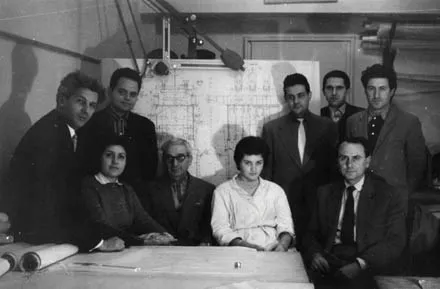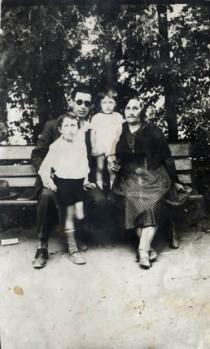Avram Merkado Natan in the group in Himmetalurgproekt, which designed the electrical arc furnace for carbide in Devnya
I am standing first on the right in the group in Himmetalurgproekt, which designed the electrical arc furnace for carbide in Devnya. The picture was taken in Sofia in 1961.
I started working as an engineer at the construction site of the present-day Danube Bridge, which was then called the Bridge of Friendship. I was the technical leader of the assembly brigades. My mother was seriously sick and my father was deep into debt in order to support our studies. I had to work one year to pay the debts. My father was also working, but it was impossible to support two students and our very sick mother with only one salary. So, he had taken loans from friends, he had not paid the rent, and because they knew him, they did not evict him. I started work and gradually I started paying the debts back. Then I transferred to Sofia in a military design organization - we designed hiding places, I designed the ventilation and other installations. I also did my military service there - that was in the summer of 1954 when we finished the bridge and I was conscripted to Boychinovtsi station [Montana district] where I spent two months. Then I went to the design organization. It was housed in the Jewish Home in Sofia. I worked there a year and a half. I did not stay any longer because I did not like all the secrecy. Then I worked a year and a half in 'Mashproekt' and then in 'Himmetalurgproekt' [design institutions in machine construction, chemistry and metallurgy, designing plants in these sectors].
Meanwhile, many Jews started emigrating to Israel. All my uncles and aunts left. Only we remained together with a cousin - Avram Pinkas. My father's brothers also left and so did their mother Sultana. My other grandmother Rebeka died in Bulgaria. Her son Yosif Geron died here too. Our ideas and education were different. We felt good here, we had jobs. We said nothing to those who left - there were even members of the Bulgarian Communist Party who emigrated. There were political prisoners and a former partisan from Ruse who left. When their families decided to leave, they left with them. That was not a question of ideology or understanding. After the tortures and the sacrifices, which the Jews experienced during World War II, the people thought, 'Let's go to our own country.' That was the main reason why they left. At one time I also thought about leaving. It was when I experienced a serious disappointment at my work place. I was given a very big project - a furnace for carbide for the plant in Devnya. That is a very explosive substance, because the carbide melts at a temperature of 2 000 degrees C by means of an electric arc with the capacity of 24 000 kilowatts. The whole furnace weighed 700 tons and contained three electrodes, each electrode weighed 45 tons. Everything was cooled by water. The project was very difficult and I invested a lot of effort and nerves in it. And then I was accused of importing foreign bricks and spending a lot of dollars, while I could have done it with Bulgarian bricks. I was under a lot of stress until I convinced them that those bricks were of a better quality.





























